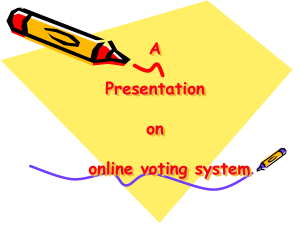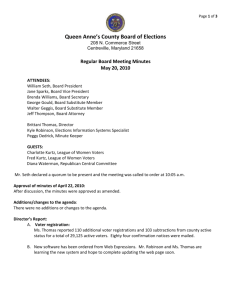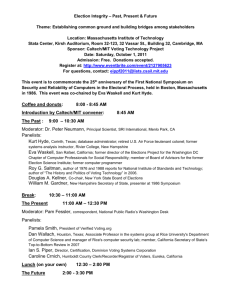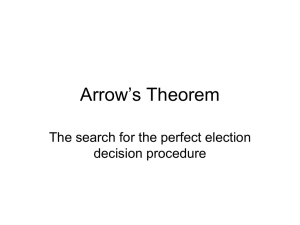Word 2000 - New Jersey Law Revision Commission
advertisement
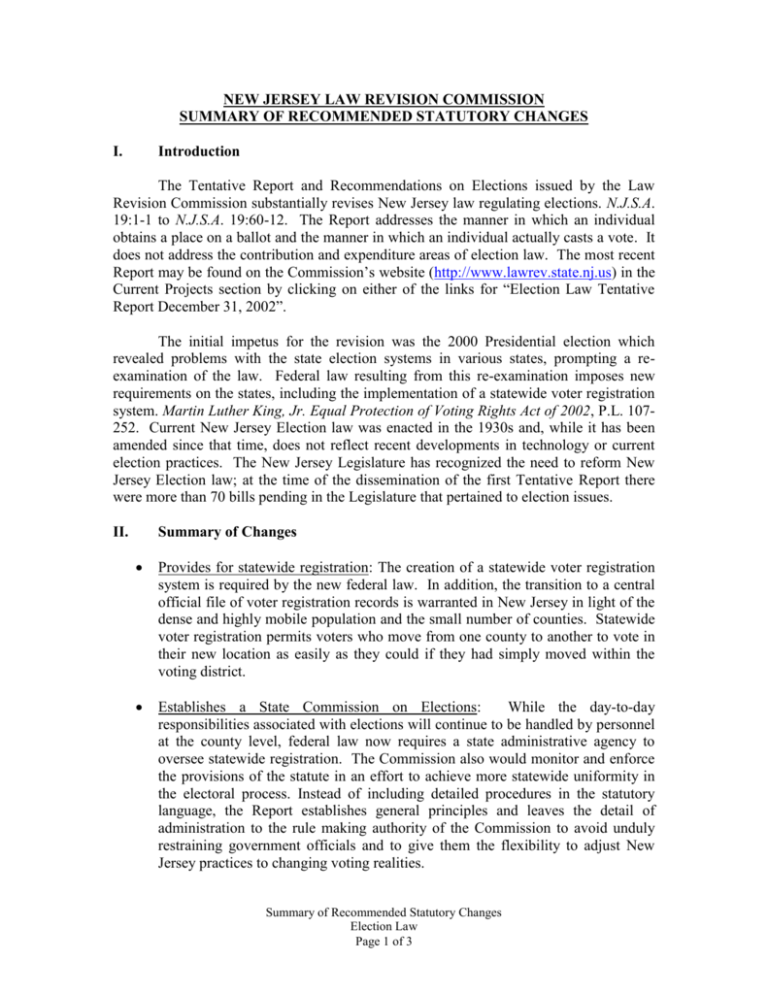
NEW JERSEY LAW REVISION COMMISSION SUMMARY OF RECOMMENDED STATUTORY CHANGES I. Introduction The Tentative Report and Recommendations on Elections issued by the Law Revision Commission substantially revises New Jersey law regulating elections. N.J.S.A. 19:1-1 to N.J.S.A. 19:60-12. The Report addresses the manner in which an individual obtains a place on a ballot and the manner in which an individual actually casts a vote. It does not address the contribution and expenditure areas of election law. The most recent Report may be found on the Commission’s website (http://www.lawrev.state.nj.us) in the Current Projects section by clicking on either of the links for “Election Law Tentative Report December 31, 2002”. The initial impetus for the revision was the 2000 Presidential election which revealed problems with the state election systems in various states, prompting a reexamination of the law. Federal law resulting from this re-examination imposes new requirements on the states, including the implementation of a statewide voter registration system. Martin Luther King, Jr. Equal Protection of Voting Rights Act of 2002, P.L. 107252. Current New Jersey Election law was enacted in the 1930s and, while it has been amended since that time, does not reflect recent developments in technology or current election practices. The New Jersey Legislature has recognized the need to reform New Jersey Election law; at the time of the dissemination of the first Tentative Report there were more than 70 bills pending in the Legislature that pertained to election issues. II. Summary of Changes Provides for statewide registration: The creation of a statewide voter registration system is required by the new federal law. In addition, the transition to a central official file of voter registration records is warranted in New Jersey in light of the dense and highly mobile population and the small number of counties. Statewide voter registration permits voters who move from one county to another to vote in their new location as easily as they could if they had simply moved within the voting district. Establishes a State Commission on Elections: While the day-to-day responsibilities associated with elections will continue to be handled by personnel at the county level, federal law now requires a state administrative agency to oversee statewide registration. The Commission also would monitor and enforce the provisions of the statute in an effort to achieve more statewide uniformity in the electoral process. Instead of including detailed procedures in the statutory language, the Report establishes general principles and leaves the detail of administration to the rule making authority of the Commission to avoid unduly restraining government officials and to give them the flexibility to adjust New Jersey practices to changing voting realities. Summary of Recommended Statutory Changes Election Law Page 1 of 3 Technological neutrality: The Report uses machine neutral language, unlike existing law. The current law provides detailed procedures for the use of paper ballots and lever machines and no procedures at all for modern voting machines. Paper ballots and lever machines, however, are no longer widely used. Since voting technology continues to develop, machine neutral language does not anchor the law in any single type of voting system that the passage of time may render obsolete. Regularization of timeline: The current law, and certain of the deadlines it contains, are no longer based on technological necessity, but have simply been carried forward from a time when printing and voting technologies could not accommodate shorter time periods. In some cases, the current law contains anomalies, including out-of-sequence deadlines. The Report shortens certain of the time periods where appropriate, corrects anomalies and clarifies the deadlines. The Report also specifies the consequences of deadlines in areas such as the replacement of candidates on a ballot to address issues such as those raised in New Jersey Democratic Party, Inc. v. Samson, --- N.J. --- (2002). Consolidation of dates: In an effort to streamline, regularize and make the election process more cost efficient, the dates on which elections are held have been reduced. All non-partisan elections, including school elections, will be held together in April. Expansion of absentee voting: The Report discontinues the current requirement that a voter provide a reason for voting by absentee ballot, and permits early voting on request. Expansion of pool of poll officials: In light of the difficulties experienced by districts statewide in staffing polling places, the Report expands the pool of potential poll officials by permitting those voters registered as independents to work at the polls on Election Day. Over half of registered voters in this State are not registered as either Democrats or Republicans; they will now be permitted to participate in this important process. Consolidation of voting offenses: While various voting offenses are presently scattered throughout the two volumes of the statute pertaining to voting, the Report consolidates the various offenses in a single chapter of the Criminal Code. Changes at county level: Although many of the responsibilities associated with elections will continue unchanged, the duties of the election officials at the county level have been rearranged to a limited extent to increase efficiency. Concerning political parties, the statutory language pertaining to county and state committee persons has been modified to eliminate gender requirements. Ballot changes: Requirements pertaining to ballots have been streamlined and modernized to avoid waste and provisional ballots will be available for those Summary of Recommended Statutory Changes Election Law Page 2 of 3 voters whose right to vote cannot be confirmed at the time they wish to vote, as will a free access notification system through which a voter can determine whether his or her vote was counted. III. Other changes to reflect federal law: To reflect the recent changes to federal law, voters will be afforded an opportunity to verify and correct their ballots before their votes are cast; voting machines will be required to be more accessible to voters; and an administrative complaint procedure for violations of federal voting law will be implemented. Conclusion Overall, the Report endeavors to clarify, simplify and streamline the election process in the State of New Jersey. This is done in an effort to increase voter participation and to make the process run more smoothly for the local, county and state officials who are responsible for the conduct of elections. IV. Implementation Deadlines The new federal statute imposes deadlines. Every state must comply with the provisional voting and voting information requirements, the registration by mail requirements, and the computerized statewide voter registration provisions by January 1, 2004, unless a waiver is granted for the latter; and with the voting systems standards by January 1, 2006. Summary of Recommended Statutory Changes Election Law Page 3 of 3



